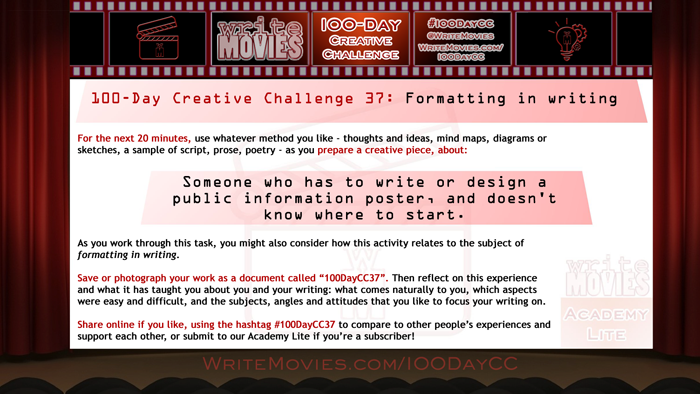Welcome to the thirty-seventh of our Creative Challenges. We’re focusing on key aspects of writing and storytelling – core elements that can always be found under the surface of every successful story in our eighth week of Creative Challenges: WriteMovies’ 100-Day Creative Challenge 37 is about formatting in writing.
Guidance: For the next 20 minutes, use whatever method you like – thoughts and ideas, mind maps, diagrams or sketches, a sample of script, prose, poetry – as you prepare a creative piece, about:
Someone who has to write or design a public information poster, and doesn’t know where to start.
- As you work through this task, you might also consider how this activity relates to formatting in writing.
- Save or photograph your work as a document called “100DayCC37”. Then reflect on this experience and what it has taught you about you and your writing: what comes naturally to you, which aspects were easy and difficult, and the subjects, angles and attitudes that you like to focus your writing on.
- Share online if you like using the hashtag #100DayCC37 to compare to other people’s experiences and support each other, or submit to our Academy Lite if you’re a subscriber!
When you complete the Challenge – or if you get completely stuck – then look at the Feedback below!
Feedback:
Formatting is crucial in writing: I’ve put this aspect of writing first for a very good reason! It’s crucial that you write in the correct format and size for your chosen output, from the start – if you haven’t, your work will be ignored by the professionals you were trying to impress. Screenwriting in particular has a lot of formatting rules – just use recognized specialised software, and from the start.
Format is influenced by purpose, size (screenplays typically work to a “1 page per minute on screen” rule), scope of project etc. Make sure you know the format, size and length that your script will need to match up to, in order to become the kind of production you’re looking to make. Novels and stage plays need to be clearly formatted too. Will your idea genuinely, and naturally, fit the requirements and shape of the format it’s aimed at? How do you know?
In this Challenge, the creator of a public information poster is someone with a particular kind of formatting challenge. They have to somehow convey a specific message, which may not be what the intended audience want to hear – in fact, probably the opposite, if it needs to be put on a poster in the first place! So getting the core message across – visually if possible, and in as few words as possible – can be a real problem. It’s not unlike the challenge writers have, compressing their story into a logline and ‘elevator pitch’, as we’ll see in a future Challenge.
General tips and feedback:
Many writers, naturally, don’t find it easy to be creative ‘on tap’ – especially for work that they didn’t set themselves. But to write professionally, you will usually need to meet deadlines and requirements, that can’t be put off, for briefs you didn’t choose for yourself: even if you’re ill or feeling down, you’ll usually have to just find a way through, and get the results that are needed, to the quality that’s necessary. So the WriteMovies Creative Challenges are designed to help you find ways around the crucial issues of ‘block’.
We do this by setting a (deceptively!) simple brief, and encouraging you to use a variety of methods, approaches and creative products in order to find ways around it, and generate some kind of outcomes that might be useful to you in the future. Whatever state your mind and mood are in – energetic or tired, stimulated or bored, motivated or disengaged, etc – there are different ‘modes’ of creative productivity which you can engage, to make the best of it: editing your work if you can’t write, making notes if you can’t generate script, etc. Try a mix of methods to make the most of activities such as the Creative Challenges, especially anytime you get stuck: just keep adding notes, sketches etc freely, you can decide later whether any of them are useful! Also note that the brief is to ‘prepare’ a creative work – not to actually make it straight away, before you feel ready to! But if you’ve come away from this with a passage of prose or script or even poetry, well done!
Hopefully this activity will have shown you the potential value of our Creative Challenges, and the benefits of making a routine to complete them, and persisting with it day by day to gradually improve all aspects of your writing and to develop solutions to ‘block’, that you will become more and more proficient with over time. We recommend that you commit to fulfilling the 100-Day Creative Challenges, sharing your outputs to gain the support and feedback of other writers working on the same activities, and if you’d like expert daily feedback from us on this and much more, additional material, subscribe to the WriteMovies Academy Lite now!


